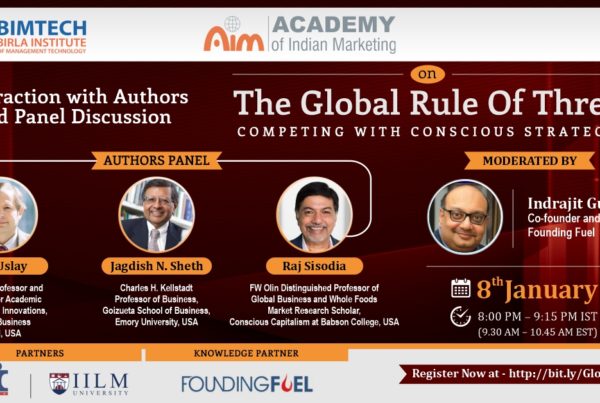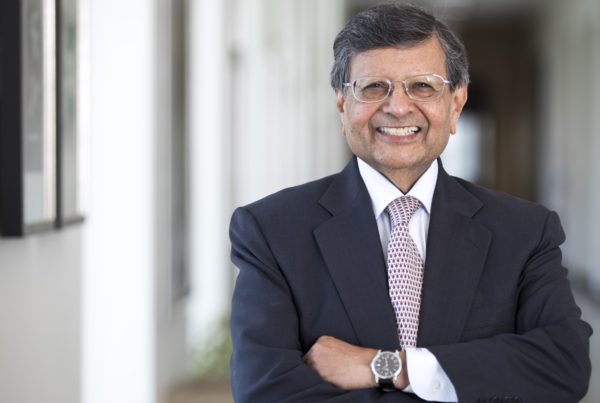In 1961, I came to the University of Pittsburgh as an MBA student. In my second semester, my marketing professor reported on a study of consumers. He said, “According to the market research conducted by Dupont Company, more and more housewives are going to the grocery store without a shopping list.” He stopped and then made an inference. “And therefore, they are buying impulsively.”
I was the only foreign student in a class of nearly 70 students. I always sat in the front and listened to every word of every professor. In India, from early childhood, we are conditioned by our parents that teachers are next only to God and that we must respect them more than them. So you never ask a question unless the teacher invites you to ask a question.
Something happened that day. I raised my hand, out of sheer impulse and asked the question, “Does this mean that all illiterate consumers are impulse buyers?”
The professor was stunned. He had never thought of low literacy in other countries. He thought for a few seconds and replied, “That’s a good question. Let me think about it.” My classmates were anticipating a good confrontation. I was not trying to put down the professor publicly. It is simply not what a good student does.
That professor became a lifelong mentor and encouraged me to do my doctorate in marketing. His name was John A. Howard, an economist who had become fascinated with the psychology of consumers. He had developed a theory of consumer loyalty to a brand based on learning theory or what we today refer to as behavioral economics. He was already a giant in marketing. He had been asked by Ford Foundation to make recommendations about what should be emphasized in teaching and research in marketing.
John A. Howard himself was a great learner. He believed in the Chinese saying “when the student is ready, the teacher will show up.” He mentioned that he can learn about cross cultural differences from me as we worked together.
He invited me to further develop his theory of buyer behavior. He was offered a chaired position at Columbia University and asked me to go with him so that we could continue to work on developing what is now referred to as “The Howard-Sheth Theory of Buyer Behavior.” It was published in 1969 and became a classic in marketing.
My doctoral dissertation was primarily to test the theory on a group of foreign adults who came to Pittsburgh as students or visiting scholars. I wanted to see if the three stages of learning hypothesized in the theory (extensive problem solving, limited problem solving and routine response behavior or habit) actually occurred in my panel over time.
The Howard-Sheth Theory of Buyer Behavior became the foundation for a long term research project called the Columbia Buyer Behavior Project. It attracted great scholars to Columbia Business School and generated several world class scholars for more than a decade.
This encounter that changed my life has one more interesting twist. I was born in Burma in 1938. My parents were from India and had settled in Burma. My father was a rice trader and only had a grade school education. But he was a great entrepreneur.
In late 1940, Japan invaded Burma. The Burmese currency was declared worthless. We lost everything and returned back to India. My father went into shock and suffered from clinical depression for more than four years. We struggled and survived primarily by pawning my mother’s jewelry and my sisters making Indian pickles and snacks for others.
I would also have been a high school dropout and probably become a shop keeper in our small town. Fortunately, I was a good student. My older sisters nurtured me to complete high school and go to college. In fact, I am the first college graduate in my family. Therefore, it is hard for me to imagine that I would become an academic scholar and specialize in psychology of consumers.
Over the years, I have learned that displacements in life build character and inner strength if you survive. I have also learned others will nurture you and invest in you to realize your potential.
I have often mentioned that if you take a grain of wheat and make a loaf of bread, the value add is three times. If you take a rough diamond and polish it, a good diamond cutter creates ten to fifteen times its value. However, if you take a human being, mentor and nurture him or her, the value add is infinite. There is no resource as powerful as human resource.






Thank you for contributing your experiences & the hardship you went through. I truly believe a good mentor always reflects its excellence in his students. There are people around who are at higher level but they never bother to encourage their colleagues working under them. There are few lucky ones who get this opportunity to enhance their knowledge & skills and culture their career.
Extremely inspiring and told in a very nice manner without being sermonistic! And I fully subscribe to the message in the last line. Thanks Sir!
Wonderful & inspirational…thanks for sharing your experiences. The experiences of the experienced ones like you act as a guiding light to the aspiring ones like me????
You have to be lucky to find a good mentor in life.
Very well written. A good mentor can work wonders.
Excellent thought provoker communicated in most simple language. Was an eyeopener on the opportunity one got by birth and luck of events shaping life. Ascribe to the conclusive line on human-being development. Happy & enlightening reading Sir!
Very inspiring and definitely keeps “no question is stupid question” come true.
Thanks for sharing and yes in life mentor is important…. In all walks
Dear Professor,
Wonderful and very inspiring. If you struggle and survive, you become stronger than diamond. A great lesson for us. I got fascinated with your research approach. Feel proud of you.